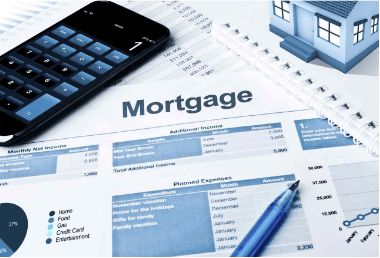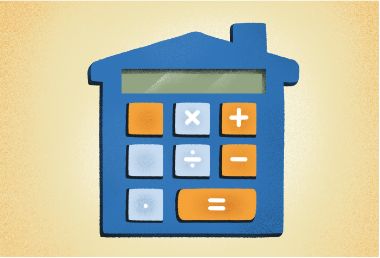Getting a mortgage is frequently a must when purchasing a home, but figuring out how much you can really afford can be challenging. Based on the purchase price, down payment, interest rate, and other monthly expenses associated with being a homeowner, a mortgage calculator can assist borrowers in estimating their monthly mortgage payments.
Methods for Computing Mortgage Payments

A mortgage calculator can provide information about your monthly payments whether you’re looking for a new mortgage or want to create an amortization table for your existing loan.
To utilize the Forbes Advisor mortgage calculator, follow these steps:
- Put the house’s price here. On the left side of the screen, begin by adding the entire purchase price of the house you’re interested in purchasing.To find out how much house you can afford, play around with this figure if you don’t have a precise one in mind.Additionally, this calculator might assist you in figuring out how much you can afford to offer on a house if you’re thinking about doing so.
- Enter the amount of your down payment.Add the anticipated down payment, expressed as a percentage of the purchase price or as a fixed sum, next.
- Put your interest rate here.Choose an interest rate from the range that you were offered if you have previously shopped around for a loan and entered it into the interest rate box on the left.You can start by entering the average mortgage rate for the current period if you haven’t already been prequalified for an interest rate.
- Select a loan duration. Enter a loan period of up to 30 years to get an estimate of your monthly mortgage payment. The rate you choose here should match the average rate you entered above if you haven’t been approved for a loan term and interest rate. Use the average rate for a 15-year mortgage, for instance, if you decide on a 15-year term. Instead, you can use this section of the calculator to examine your options if you want a balance between cheap monthly payments and a shorter term.
- Include homeowners association (HOA) dues, insurance, and taxes. Although it’s optional, using this part of the calculator can help you see your prospective monthly payments more clearly. Enter your monthly payments for homeowners insurance, private mortgage insurance (PMI), property taxes, and HOA dues if you have the necessary data. If these statistics are not in front of you, you might be able to find out some information by visiting the website of your local property assessor or your real estate agent.
- Examine the specifics of your loan. Your payment breakdown will automatically appear on the right side of the page once you have input all necessary data on the left side.You can see your projected payoff month and your monthly payments in this section of the calculator. To see how much of your yearly payments will go toward interest and principal, select the amortization schedule tab. To examine a breakdown of each monthly payment, you can easily switch between the annual and monthly view.
How to Deconstruct the Mortgage Payment Calculation

Although it can be complicated, the mortgage paydown formula has several benefits. It makes it easier for current and potential homeowners to understand how raising their monthly payment might affect both their entire asset profile and monthly budget.
See our mortgage payoff calculator for a complete breakdown.
What Makes a Mortgage Calculator Useful?
- Among its various uses are the following benefits of a mortgage calculator:
- Figure out how much the loan will cost you in total.
- Using the projected sale price, down payment, and interest rate as a basis, calculate your monthly payments.
- Decide on a budget to shop within.
- Compare loan types’ payments.
- Check the potential amount of your mortgage payment when taxes, homeowners insurance, private mortgage insurance, and/or HOA dues are included.
You can play around with various variables and scenarios at any time using these online calculators, which are free to use.
Average Mortgage Charges and Fees
The lingo can be intimidating if you are searching for a mortgage for the first time. It can also be challenging to comprehend what you’re paying for and why.
When analyzing your mortgage charges and fees, keep an eye out for the following:
- Principal: The principal on your mortgage is the amount you borrowed. As you make monthly payments, a percentage of each one will go toward paying this off, bringing the total down.
- Rate of interest: In essence, you are paying the lender this amount in order to borrow the money. Your interest rate can be variable or fixed, and it is stated as a percentage.
- taxes on real estate. Local tax authorities are responsible for enforcing property taxes. Usually, you may view this number on the website of your assessor or recorder, or anywhere else you access real estate documents such as property cards.
- Insurance for homeowners: In the event that your home is damaged, homeowners insurance is necessary to safeguard both you and your lender.Ask the real estate agent if they have any information regarding current insurance charges if you’re thinking about buying a house. If not, obtain an estimate from a local insurance agency.
- Insurance for mortgages:Also referred to as private mortgage insurance, or PMI, this safeguards the lender in the event that you don’t pay back your mortgage.You will need to account for it if your down payment is less than 20%. It normally varies from 0.58% to 1.86% of your entire mortgage amount.
HOA costs. You could have to pay homeowner association dues if you purchase a home in a shared community, like a condominium complex. Private groups called HOAs are established to oversee and manage these areas. Even if the fees are little, they could make your monthly payments intolerable.
What Size Home Are You Able To Buy?

Put another way, a mortgage term is the amount of time you have to pay off your mortgage. It is the period of time during which a mortgage is amortized. Although there are various lengths available that can even go as high as 40 years, the most popular mortgage terms are 15 and 30 years.Your monthly payment amount is determined, at least in part, by the length of your mortgage term; the longer the period, the lower the monthly payment.
Nevertheless, interest rates for 15-year mortgages are often lower than those for 30-year durations, and the interest paid on a 30-year loan is higher. Take into account how much you can afford to pay each month and how soon you would like to have your mortgage paid off to choose the best mortgage term for you.
Different Applications for Mortgage Calculators
A mortgage calculator can be used for refinancing or early mortgage repayment, but it is most useful for individuals who are intending to purchase a property.
In order to see your payments dependent on your credit score or the state of the market, you may also change the interest rates. If you are in good credit standing, you should be able to get the best interest rate. You can still be eligible for a mortgage even if your credit isn’t the best, but it might not be at the best rate.
Frequently Asked Questions (FAQs)
- What Are The Current Rates for Mortgages?
Visit the Forbes Advisor mortgage rates page to remain current, compare current mortgage rates, and read daily analysis. - How Do Mortgages Operate?
A mortgage is a type of secured loan where the house being financed serves as security. This implies that until the mortgage is paid in full, the lender will have a lien on your house. You will pay principal, interest, taxes, and insurance each month after closing. The bank may be able to foreclose on your home if you don’t make mortgage payments. - What Kinds of Mortgages Are There?
Not only are there various mortgage lengths available, but there are also numerous typical mortgage kinds. These consist of both conventional loans and jumbo mortgages, which are provided by private lenders but have stricter requirements since they go above the Federal Housing Finance Administration’s (FHFA) limit loan amounts.
Additionally, prospective homeowners may obtain mortgages guaranteed by the federal government, such as 203(k) loans, the Federal Housing Administration (FHA), the Department of Veterans Affairs (VA), and the Department of Agriculture (USDA). These mortgages have varying minimum requirements, but they are all meant for first-time and low- to mid-income buyers. - How Can a Mortgage Application Be Made?
In addition to several internet lenders, conventional banks and credit unions also offer mortgages.In order to qualify for a reduced interest rate when applying for a mortgage, start by examining your credit profile and raising your credit score.Next, figure out how much house you can afford, taking into account the amount of the down payment. - Reverse Mortgage: What Is It?
When a homeowner takes out a reverse mortgage, they must have amassed a sizable amount of equity in their houses.The borrower may not always return the debt; they must be at least 62 years old.The loan is repaid with the proceeds from the sale of the property when the borrower moves or passes away.






Leave a Reply